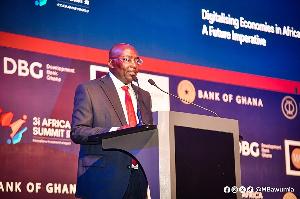 Vice President, Dr. Mahamudu Bawumia
Vice President, Dr. Mahamudu Bawumia
Significant reforms in the formal sector over the past three decades have led to economic stability and predictable growth rates across African nations, particularly in Ghana, Vice President Dr. Muhammadu Bawumia has said.
This stable economic environment has created a fertile ground for financial technology (Fintech) growth, which the Vice President believes must be strategically built upon to propel the continent’s economic transformation.
Speaking at the 3i Africa Summit in Accra, Dr. Bawumia stressed the transformative impact of these reforms.
“African nations have undertaken significant reforms in the formal sector and achieved remarkable strides in macroeconomic management,” he said, highlighting the stability these efforts have fostered, paving the way for Fintech innovation.
The Vice President pointed to the critical role of mobile technology in accelerating Fintech adoption. Africa currently boasts over 489 million mobile phone users, a number expected to reach 700 million by 2030.
This extensive mobile connectivity has enabled Fintech services to penetrate previously underserved communities, driving economic inclusion and transforming consumer purchasing habits.
“Mobile phone usage in Africa stands as one of the foremost catalysts driving the Fintech revolution across the continent,” Dr. Bawumia stated.
He noted the rapid growth in mobile financial services, which have facilitated digital payments and e-commerce. Online sales in Africa are projected to reach US$75billion by 2025, a significant increase from US$8billion in 2013, largely due to the rise of digital payment platforms.
Investment in the Fintech sector has surged, reflecting growing confidence among investors.
“We are witnessing a growing interest from investors in Fintech and technology start-ups. This influx of capital highlights the potential of the industry and the confidence investors have in the future,” Dr. Bawumia noted.
He added that between 2021 and 2022, 40 to 60 percent of venture capital funding in Africa was directed toward Fintech start-ups, underscoring the sector’s appeal.
Despite these advancements, Dr. Bawumia acknowledged the challenges posed by the regulatory environment. He highlighted the proactive steps taken by countries like Ghana and Rwanda in establishing regulatory sandboxes which allow start-ups to innovate within a controlled environment.
“Regulatory sandboxes provide regulators with valuable insights into emerging technologies and business models, enabling them to develop informed and effective regulations,” he explained.
This approach, he explains, not only facilitates innovation but also boosts investor confidence by ensuring a stable regulatory landscape.
A critical component of Fintech’s success in Africa, according to Dr. Bawumia, is the development of digital identities and mobile money interoperability. He emphasised that without these elements, achieving widespread financial inclusion would be difficult.
“A country with no unique digital identity systems and mobile money interoperability between bank accounts and mobile money accounts will ultimately be less financially inclusive,” he asserted.
Dr. Bawumia also discussed the importance of credit scoring systems tailored to Africa’s unique context. Traditional bank-based credit scoring models are inadequate for a continent where most people use mobile money accounts. Ghana’s innovative approach, which leverages mobile money accounts and national IDs to provide credit scores, serves as a model for other African nations.
Looking to the future, Dr. Bawumia highlighted the potential role of central bank digital currencies (CBDCs) in the Fintech space. He urged stakeholders to consider the interface between CBDCs and Fintech innovations as part of Africa’s ongoing digital transformation.
“It is imperative that we embrace responsible innovation, creating a balance between pushing technological boundaries and ensuring ethical considerations and regulatory compliance,” he said.
By prioritising education, training and investment in cutting-edge technologies, he said Africa can build a resilient and inclusive Fintech ecosystem that drives economic growth and improves lives across the continent.
“We stand at a pivotal juncture in the evolution of Fintech and tech sectors in Africa, where the choices we make today will profoundly influence our trajectory for years if not decades to come,” he stated.